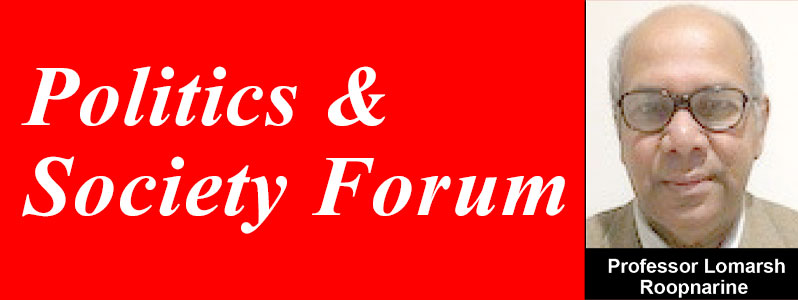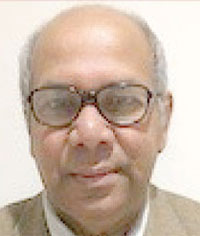IN tandem with the growing wave of Guyanese overseas scholars, I asked Aliyah Khan, a Professor of English and Afro-American and African Studies, and the Director of the Global Islamic Studies Center at the University of Michigan, Ann Arbor, to do an interview with me on her recently published book: Far from Mecca: Globalizing the Muslim Caribbean (Rutgers University Press and University of the West Indies Press, 2020). The book received honourable mention in the 2021 Modern Language Association Prize for a First Book, and awards from the American Comparative Literature Association and the American Association of University Women. Far from Mecca is the first academic monograph to address the comparative history, culture, and music of Indo- and Afro-Caribbean Muslims in Guyana, Trinidad, and Jamaica. The book argues Muslim Caribbean identity is performative and not fixed, and that Caribbean Islam troubles post-colonial creolization discourse in the region.
Lomarsh Roopnarine (LR): What has inspired you to write this remarkable book on Muslims in the Caribbean?
Aliyah Khan (AK): I’m a Guyanese Muslim who was raised in Georgetown before immigrating to the U.S. in high school. I was a Queen’s College student like my father Jan Khan before me. My maternal grandfather, Mohamed Rasheed, is an imam in Georgetown, and his father Meer Mohamed Abdur Rahman, whose family was from Lucknow, India, was an early imam at the Queenstown Jama Masjid. Caribbean people must do a lot of archival research and excavation to discover our enslaved and indentured ancestors. I wrote the book I wish had existed for me to read as a young person, on the history of Caribbean and Guyanese Islam.
LR: Your background places you in a “privileged” position to write Far from Mecca. What is the purpose of this book in terms of historical and contemporary importance and significance?
AK: It is the first single-author academic book to examine the history, culture, and music of Indian and African Caribbean Muslims together. Before 1990’s attempted Trinidad government coup by the Jamaat al-Muslimeen, a primarily Black Muslim organisation, Anglophone Caribbean people assumed Islam was a religion of Indian indentured labourers and their descendants. But Islam was also the religion of at least 10 per cent of enslaved West Africans in the Americas. I discuss 19th century Jamaican and Trinidadian autobiographies written in Arabic by enslaved, literate Muslims originally from Guinea, Senegambia, and Mali. As Walter Rodney emphasised, Africans and Indians in Guyana share a colonial labour history, and even a religious heritage, which we must remember to build a better future together.
LR: You are correct in stating that the early Muslim African Caribbean has often been misconstrued or marginalised within the larger historiography of Caribbean Muslims. However, I think you did an excellent job in mapping the historical journey of African and Indian Muslims in the Caribbean. What are some commonalities and differences among these ethnic Muslims? What has kept these individuals together as Caribbean Muslims?

AK: African and Indian Muslims preserved their ancestral Islam as much as possible under colonialism: enslaved Africans wrote Islamic treatises and prayed in secret, and indentured Indians set up mosques and found imams to lead prayers on plantations. Both Muslim groups were resistant to Christian conversion by European missionaries. We have stories of early indentured Indian Muslims and manumitted African Muslims who recognised their shared religion in 19th century Trinidad.
LR: So what happened in the contemporary period?
AK: After Independence, Indian and African Muslims often separated: for example, the Central Islamic Organisation of Guyana has been predominantly Indian. Demographically, there were few Black Muslims in Guyana until 20th-century conversions or reversions. The Muslim Brotherhood of Guyana or “Muslaman: Ujamaa Wa Guyana,” the country’s first Black Muslim organisation, was formed in the mid-1960’s independence era. Racial barriers are less the case now, with influence from Middle Eastern countries and Arab religious education, and a decrease in so-called “Indian cultural” Islam—although I don’t know if we should replace that with Arabized dress and customs. But it’s good to recognise our shared labour and religious history.
LR: You have addressed what you described as “Marvelous Muslim” and “Muslim Time” in your book.” Can you expound on these descriptions?
AK: “Marvelous Muslim” comes from Cuban writer Alejo Carpentier’s “marvelous realism,” which precedes “magical realism” as the surrealist landscape that describes the extreme violence of the colonised Caribbean. “Marvelous Muslim” describes the excesses associated with Muslims: fanaticism, terrorism, patriarchy, and shifting loyalties.
LR: And in the case of “Muslim Time?”
AK: “Muslim Time” is from Trini calypsonian David Rudder’s song “Hoosay,” which he was kind enough to permit me to quote in the book. “Hoosay” was written after and about the 1990 Trinidadian Jamaat al-Muslimeen coup. In the song, “Muslim time” is when, metaphorically, “Hosay is number one.” Hosay or Tadjah is the colonial Indo-Muslim procession with model tombs (tadjahs) marking the Shia Muslim holiday of Muharram and the Prophet’s grandson Hussein’s martyrdom. The British violently squashed this Muslim holiday in the Caribbean because it came to have participants from all races and religions. It’s still celebrated in Trinidad and Jamaica, but not really Guyana. “Muslim time” is when Islam enters public discourse as a “revolutionary threat” to the Caribbean, with Hosay, then the Muslimeen, and more recently, Caribbean nationals travelling abroad to join the Islamic State in Syria. I interviewed Muslimeen leader Imam Yasin Abu Bakr for the book before he passed away recently, as he became the Caribbean’s number one “Islamic terrorist” after the coup.
LR: As you know, the label “Fullaman” is a derogatory one in Guyana, the F word, yet you stated that the postcolonial Caribbean creolisation discourse “is generally troubled by the Muslim in its midst because the local fullaman Muslim forces engagement with contemporary global concerns and exposes the limitation of hybridity and diaspora” (p.34). This is a strong statement. Do you still stand by it? If so, break it down for the readers.
AK: Yes, I stand by my statement, taken in context and prefaced by an examination of the etymology of “fullaman”. “Fullaman” helps us understand Guyanese Muslim history: though it can derogatorily denote any Muslim now, it is derived from a West African Muslim tribal name, Fula or Fulani, indicating that Islam’s history in Guyana is both African and Indian. In Trinidad, “Mandinga” or “Madinga” denotes Muslims, similarly deriving from enslaved West African Mande or Mandinka people. Because of chattel slavery, African Muslims did not leave direct Caribbean Muslim descendants, but they left writings and linguistic traces.
 LR: What about the harsh side of the label “Fullaman”?
LR: What about the harsh side of the label “Fullaman”?
AK: “Fullaman” is a cacophemism. That is a word used as a harsh substitute for another word, but it can also be humorous. I grew up around Muslims jokingly calling each other “fullaman”, meaning a Muslim who is religiously performative and pompous. But it can be used harshly, by non-Muslims. It all depends on context. I wouldn’t use the word casually.
LR: How would you explain “Fullaman” in relation to creolisation and hybridity?
AK: Creolisation and hybridity the multiethnic melding of colonised peoples into one unity, are frameworks through which Caribbean nation-states create themselves: “One People, One Nation, One Destiny,” as Guyana’s motto goes. By using “fullaman,” which shifted meanings from the global African Fulani to the local Guyanese Muslim of any race, I argue that Caribbean Islam exposes the limitations of hybridity and diaspora.
LR: What would you like readers to know about your book?
AK: That Muslims have been a part of Guyanese and Caribbean history since the earliest colonial era. Islam is an ancestral religion of both Africans and Indians in the Caribbean. We cannot define our Caribbean Muslim history in U.S. terms, using 9/11 and American national discourse as a benchmark.
LR: Are you working on any future projects in the Muslim Caribbean?
AK: Yes, I am writing an article on Muslim devotional music in Guyana, Trinidad, and Suriname—qasidas, songs brought by Indian indentured laborers, which one can now hear at Eid Milad or Moulood religious celebrations, on album compilations, and in regional competitions. For example, my former madrasa school teacher from the United Sad’r Islamic Anjuman Masjid in Kitty, Georgetown, Ustadh Nazim Bacchus, is a well-known Guyanese qasida singer and competition judge.
LR: Wow, I am impressed with your project on qasidas? Can you share some more thoughts on it?
AK: I’m excavating the origins of Caribbean qasida songs in 19th and early 20th century Indian poetry—in the indentureship period. Some of the qasidas, notably ones praising the Prophet Muhammad, appear in Urdu in the Islamic text Milad-e-Akbar by Sufi Khwaja (Saint) Muhammad Akbar Warsi, who was born in pre-Independence Meerut, India, and died in Karachi, Pakistan in 1953. There is more research on Hindu Caribbean devotional music like bhajans, so I’m filling the religious music gap. I will also discuss Caribbean Islamic theological controversies over the public performance of qasidas, and vocal and instrumental music.
LR: Thank you.
In sum, Professor Khan reveals the historical continuity and cultural production of Caribbean Muslim identity amid the multifaceted Caribbean where race, class, gender, and religion matter. Far from Mecca brings out the displacement of Muslims and places them at the center of Caribbean and hemispheric American discourse, and, in doing so, Khan has done an enormous justice to the understudied and undertheorized field of Muslim and Islamic Caribbean Studies. The book deserves a place on the top shelf of Caribbean literature (lomarsh.roopnarine@jsums.edu).












